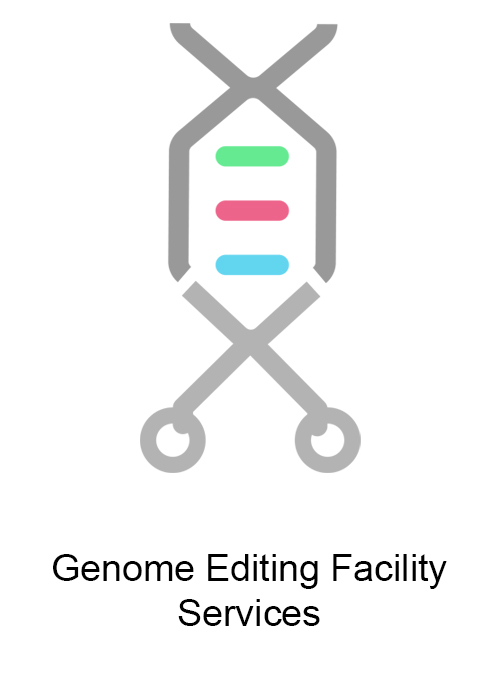Genome Editing Facility
CRISPR (Clustered Regularly Interspaced Short Palindromic Repeats) technology is a relatively facile method for editing genes. Editing allows researchers to elucidate the function of genes, leading to new products and
procedures with benefits to human health and well being. Gene-edited cells are a useful tool for understanding disease processes and how we might intervene.
The genes of these cells may be overexpressed, knocked-out, or otherwise
edited in various ways to mimic diseased cells that will respond to experimental treatment as would the tissues being modeled.
The Genome Editing Core Facility offers a suite of services to support researchers who use these kinds of cells:
- Design and cloning of customized plasmids for lentiviral vector production
- Lentiviral packaging and production for gene knockdown and overexpression
- Customized cloning for CRISPR-based genome editing
- On-site lentiviral transduction (BSL2 cell culture facility required)
- Consultation on design of lentiviral vector and genome editing tools
- Access to facility instrumentation and plasmid library
Equipment:
- BSL2 Biosafety Cabinet
- CO2 Incubator
- Ultracentrifuge
- Ultra-low freezer
- Biomedical Refrigerator
- Biomedical Freezer
- Liquid Nitrogen Storage Tank
- Multimode Plate Reader
- Luminometer
- Refrigerated Centrifuge
- Vertical Polyacrylamide Gel Electrophoresis System
- Real-Time PCR System
- Inverted Fluorescence Microscope
- Semi-Dry Transfer System

Laboratory Service Guidelines
Clients who wish to avail the services of the GEF must accomplish the following forms:
- Completely filled out Service Request Form (Form B).
- BSL2 Certification from the client’s institute’s biosafety committee.
The accomplished forms must be sent to gefservices@mbb.upd.edu.ph with the subject GEF Service: [Name of Lab/Institute]. Please wait for a confirmation receipt and the billing statement for the required service. GEF will only commence the service once the official receipt from the UPD Cash Office has been issued.
For clients who wish to avail of transduction services, additional documents and forms are required for each cell line sample submission:
- Signed Material Transfer Agreement (Form A).
- Completely filled out Transmittal Form (Form C).
- Certification authenticating the identities of the cell lines.
- Certification authenticating the cell line samples to be mycoplasma-free. Please attach results of the assay if done In-house.
At least 1-mL of cryogenically stored cell solution must be submitted prior to generation of lentiviral particles. Samples must adhere to the triple-packaging system based on the WHO biosafety guidelines. Samples must also be transported in appropriate storage conditions (ie with dry ice).
For sub-cloning of target genes into lentiviral overexpression vectors, entry plasmids must be dissolved in nuclease-free water at a concentration of 200ng/μL with volume not lower than 50μL. Please secure the microfuge tube with parafilm prior to transport.
- GEF will not proceed with the genome editing service if any of the required documents from above are missing.
- Clients must inform GEF of the growth conditions including cell culture media, supplements and any other pertinent conditions two weeks prior to sending of the cell line sample. For cell lines that require specialized media supplements, GEF can procure the required material however this will take at least 3-months owing to the government procurement process. Alternatively, the client can supply GEF with the cell line to expedite service time.
- The client will shoulder the courier fees associated with transporting the cell line samples and/or the lentiviral particles.